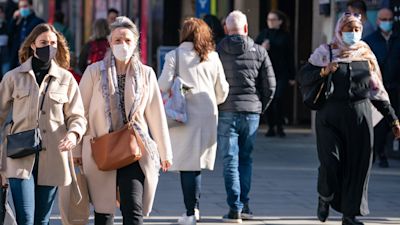Covid rates in England similar to January - just after peak of second wave

Rates of Covid-19 in England have risen to similar levels to January 2021, just after the peak of the second wave, and when the country went back into lockdown.
New data shows in the past month, the prevalence of the virus was 1.57% (the same as January) and an increase from 0.83% in September.
School-aged children had the highest rates of infection while just over one in 10 new infections were identified as a "variant of concern".
The new figures come as the government continues to urge people to get their booster jab, with Boris Johnson warning on Monday: "If we want to avoid restrictions on our daily lives we must all get vaccinated as soon as we are eligible."
Coronavirus: What you need to know
What else can the data tell us?
Though it was school-aged children with the highest levels of infection, data from Imperial College London’s React-1 study showed prevalence had increased across most age groups, and regions in recent months.
This peaked near the end of October and did see a slight fall as we moved into November.
Children aged 13 to 17 had the highest rates of infection (5.21%) followed by those aged five to 12 (4.95%)
Christl Donnelly, professor of statistical epidemiology, Imperial College London, said asymptomatic infections were increasingly prevalent.
"It is absolutely the case that if people are waiting for symptoms to do a test and to therefore identify that they are infected, and therefore cut back their contacts, being asymptomatic may facilitate transmission for example.
"It is asymptomatic transmission that really can make the difference between what’s relatively easily containable and what needs vaccination."
No new variants emerged from the data, however, with all of the cases the Delta variant or sub-lineages.
The AY.4.2 mutation which officials are monitoring as a "variant under investigation" represented 11.8% of infections.
Researchers found that third vaccine doses for eligible adults and the vaccination of children aged 12 and over are associated with lower infection risk.
Jabbing children should, therefore, remain a high priority researchers said.
The study has been released as a pre-print that has not been through peer review and is not published in a journal.
Researchers say the observational nature of survey data and the relatively small proportion of unvaccinated adults calls into question the comparability of vaccinated and unvaccinated groups.